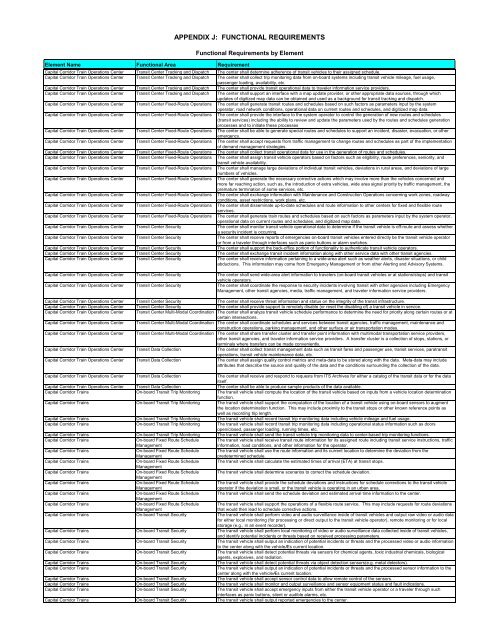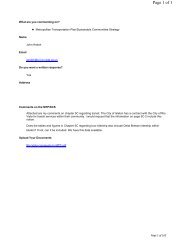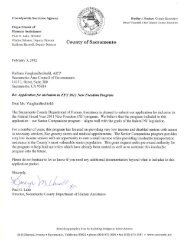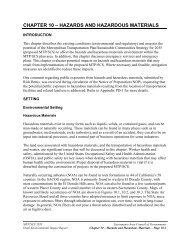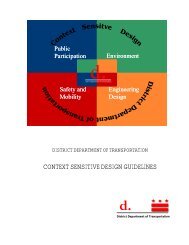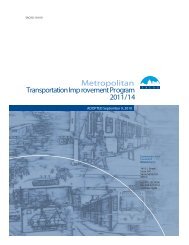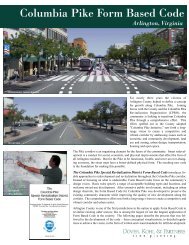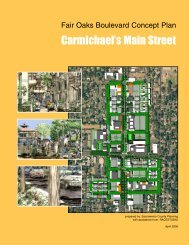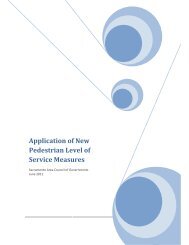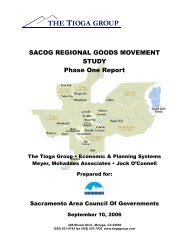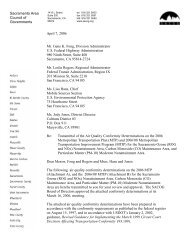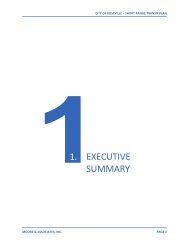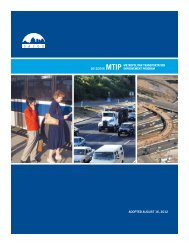Strategic Deployment Plan - sacog
Strategic Deployment Plan - sacog
Strategic Deployment Plan - sacog
Create successful ePaper yourself
Turn your PDF publications into a flip-book with our unique Google optimized e-Paper software.
APPENDIX J: FUNCTIONAL REQUIREMENTS<br />
Functional Requirements by Element<br />
Element Name Functional Area Requirement<br />
Capital Corridor Train Operations Center Transit Center Tracking and Dispatch The center shall determine adherence of transit vehicles to their assigned schedule.<br />
Capital Corridor Train Operations Center Transit Center Tracking and Dispatch The center shall collect trip monitoring data from onboard systems including transit vehicle mileage, fuel usage,<br />
passenger loading, availability, etc.<br />
Capital Corridor Train Operations Center Transit Center Tracking and Dispatch The center shall provide transit operational data to traveler information service providers.<br />
Capital Corridor Train Operations Center Transit Center Tracking and Dispatch The center shall support an interface with a map update provider, or other appropriate data sources, through which<br />
updates of digitized map data can be obtained and used as a background for transit tracking and dispatch.<br />
Capital Corridor Train Operations Center Transit Center FixedRoute Operations The center shall generate transit routes and schedules based on such factors as parameters input by the system<br />
operator, road network conditions, operational data on current routes and schedules, and digitized map data.<br />
Capital Corridor Train Operations Center Transit Center FixedRoute Operations The center shall provide the interface to the system operator to control the generation of new routes and schedules<br />
(transit services) including the ability to review and update the parameters used by the routes and schedules generation<br />
processes and to initiate these processes<br />
Capital Corridor Train Operations Center Transit Center FixedRoute Operations The center shall be able to generate special routes and schedules to support an incident, disaster, evacuation, or other<br />
emergency.<br />
Capital Corridor Train Operations Center Transit Center FixedRoute Operations The center shall accept requests from traffic management to change routes and schedules as part of the implementation<br />
of demand management strategies.<br />
Capital Corridor Train Operations Center Transit Center FixedRoute Operations The center shall collect transit operational data for use in the generation of routes and schedules.<br />
Capital Corridor Train Operations Center Transit Center FixedRoute Operations The center shall assign transit vehicle operators based on factors such as eligibility, route preferences, seniority, and<br />
transit vehicle availability.<br />
Capital Corridor Train Operations Center Transit Center FixedRoute Operations The center shall manage large deviations of individual transit vehicles, deviations in rural areas, and deviations of large<br />
numbers of vehicles.<br />
Capital Corridor Train Operations Center Transit Center FixedRoute Operations The center shall generate the necessary corrective actions which may involve more than the vehicles concerned and<br />
more far reaching action, such as, the introduction of extra vehicles, wide area signal priority by traffic management, the<br />
premature termination of some services, etc.<br />
Capital Corridor Train Operations Center Transit Center FixedRoute Operations The center shall exchange information with Maintenance and Construction Operations concerning work zones, roadway<br />
conditions, asset restrictions, work plans, etc.<br />
Capital Corridor Train Operations Center Transit Center FixedRoute Operations The center shall disseminate uptodate schedules and route information to other centers for fixed and flexible route<br />
services.<br />
Capital Corridor Train Operations Center Transit Center FixedRoute Operations The center shall generate train routes and schedules based on such factors as parameters input by the system operator,<br />
operational data on current routes and schedules, and digitized map data.<br />
Capital Corridor Train Operations Center Transit Center Security The center shall monitor transit vehicle operational data to determine if the transit vehicle is offroute and assess whether<br />
a security incident is occurring.<br />
Capital Corridor Train Operations Center Transit Center Security The center shall receive reports of emergencies onboard transit vehicles entered directly be the transit vehicle operator<br />
or from a traveler through interfaces such as panic buttons or alarm switches.<br />
Capital Corridor Train Operations Center Transit Center Security The center shall support the backoffice portion of functionality to authenticate transit vehicle operators.<br />
Capital Corridor Train Operations Center Transit Center Security The center shall exchange transit incident information along with other service data with other transit agencies.<br />
Capital Corridor Train Operations Center Transit Center Security The center shall receive information pertaining to a widearea alert such as weather alerts, disaster situations, or child<br />
abductions. This information may come from Emergency Management or from other Alerting and Advisory Systems.<br />
Capital Corridor Train Operations Center Transit Center Security The center shall send widearea alert information to travelers (onboard transit vehicles or at stations/stops) and transit<br />
vehicle operators.<br />
Capital Corridor Train Operations Center Transit Center Security The center shall coordinate the response to security incidents involving transit with other agencies including Emergency<br />
Management, other transit agencies, media, traffic management, and traveler information service providers.<br />
Capital Corridor Train Operations Center Transit Center Security The center shall receive threat information and status on the integrity of the transit infrastructure.<br />
Capital Corridor Train Operations Center Transit Center Security The center shall provide support to remotely disable (or reset the disabling of) a transit vehicle in service.<br />
Capital Corridor Train Operations Center Transit Center MultiModal Coordination The center shall analyze transit vehicle schedule performance to determine the need for priority along certain routes or at<br />
certain intersections.<br />
Capital Corridor Train Operations Center Transit Center MultiModal Coordination The center shall coordinate schedules and services between transit agencies, traffic management, maintenance and<br />
construction operations, parking management, and other surface or air transportation modes.<br />
Capital Corridor Train Operations Center Transit Center MultiModal Coordination The center shall share transfer cluster and transfer point information with multimodal transportation service providers,<br />
other transit agencies, and traveler information service providers. A transfer cluster is a collection of stops, stations, or<br />
terminals where transfers can be made conveniently.<br />
Capital Corridor Train Operations Center Transit Data Collection The center shall collect transit management data such as transit fares and passenger use, transit services, paratransit<br />
operations, transit vehicle maintenance data, etc.<br />
Capital Corridor Train Operations Center Transit Data Collection The center shall assign quality control metrics and metadata to be stored along with the data. Metadata may include<br />
attributes that describe the source and quality of the data and the conditions surrounding the collection of the data.<br />
Capital Corridor Train Operations Center Transit Data Collection The center shall receive and respond to requests from ITS Archives for either a catalog of the transit data or for the data<br />
itself.<br />
Capital Corridor Train Operations Center Transit Data Collection The center shall be able to produce sample products of the data available.<br />
Capital Corridor Trains Onboard Transit Trip Monitoring The transit vehicle shall compute the location of the transit vehicle based on inputs from a vehicle location determination<br />
function.<br />
Capital Corridor Trains Onboard Transit Trip Monitoring The transit vehicle shall support the computation of the location of a transit vehicle using onboard sensors to augment<br />
the location determination function. This may include proximity to the transit stops or other known reference points as<br />
well as recording trip length.<br />
Capital Corridor Trains Onboard Transit Trip Monitoring The transit vehicle shall record transit trip monitoring data including vehicle mileage and fuel usage.<br />
Capital Corridor Trains Onboard Transit Trip Monitoring The transit vehicle shall record transit trip monitoring data including operational status information such as doors<br />
open/closed, passenger loading, running times, etc.<br />
Capital Corridor Trains Onboard Transit Trip Monitoring The transit vehicle shall send the transit vehicle trip monitoring data to centerbased trip monitoring functions.<br />
Capital Corridor Trains<br />
Onboard Fixed Route Schedule<br />
Management<br />
The transit vehicle shall receive transit route information for its assigned route including transit service instructions, traffic<br />
information, road conditions, and other information for the operator.<br />
Capital Corridor Trains<br />
Onboard Fixed Route Schedule<br />
Management<br />
The transit vehicle shall use the route information and its current location to determine the deviation from the<br />
predetermined schedule.<br />
Capital Corridor Trains<br />
Onboard Fixed Route Schedule The transit vehicle shall calculate the estimated times of arrival (ETA) at transit stops.<br />
Management<br />
Capital Corridor Trains<br />
Onboard Fixed Route Schedule The transit vehicle shall determine scenarios to correct the schedule deviation.<br />
Management<br />
Capital Corridor Trains<br />
Onboard Fixed Route Schedule<br />
Management<br />
The transit vehicle shall provide the schedule deviations and instructions for schedule corrections to the transit vehicle<br />
operator if the deviation is small, or the transit vehicle is operating in an urban area.<br />
Capital Corridor Trains<br />
Onboard Fixed Route Schedule The transit vehicle shall send the schedule deviation and estimated arrival time information to the center.<br />
Management<br />
Capital Corridor Trains<br />
Onboard Fixed Route Schedule<br />
Management<br />
The transit vehicle shall support the operations of a flexible route service. This may include requests for route deviations<br />
that would then lead to schedule corrective actions.<br />
Capital Corridor Trains Onboard Transit Security The transit vehicle shall perform video and audio surveillance inside of transit vehicles and output raw video or audio data<br />
for either local monitoring (for processing or direct output to the transit vehicle operator), remote monitoring or for local<br />
storage (e.g., in an event recorder).<br />
Capital Corridor Trains Onboard Transit Security The transit vehicle shall perform local monitoring of video or audio surveillance data collected inside of transit vehicles,<br />
and identify potential incidents or threats based on received processing parameters.<br />
Capital Corridor Trains Onboard Transit Security The transit vehicle shall output an indication of potential incidents or threats and the processed video or audio information<br />
to the center along with the vehicleÆs current location.<br />
Capital Corridor Trains Onboard Transit Security The transit vehicle shall detect potential threats via sensors for chemical agents, toxic industrial chemicals, biological<br />
agents, explosives, and radiation.<br />
Capital Corridor Trains Onboard Transit Security The transit vehicle shall detect potential threats via object detection sensors(e.g. metal detectors).<br />
Capital Corridor Trains Onboard Transit Security The transit vehicle shall output an indication of potential incidents or threats and the processed sensor information to the<br />
center along with the vehicleÆs current location.<br />
Capital Corridor Trains Onboard Transit Security The transit vehicle shall accept sensor control data to allow remote control of the sensors.<br />
Capital Corridor Trains Onboard Transit Security The transit vehicle shall monitor and output surveillance and sensor equipment status and fault indications.<br />
Capital Corridor Trains Onboard Transit Security The transit vehicle shall accept emergency inputs from either the transit vehicle operator or a traveler through such<br />
interfaces as panic buttons, silent or audible alarms, etc.<br />
Capital Corridor Trains Onboard Transit Security The transit vehicle shall output reported emergencies to the center.


